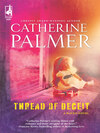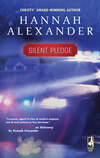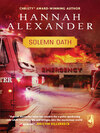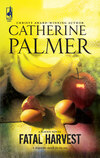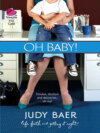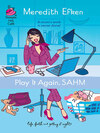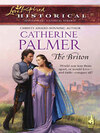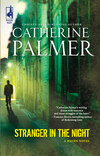Kitabı oku: «Thread Of Deceit», sayfa 3
“I’m not that into laundry,” she said. “I send most of my clothing to a dry cleaner.”
He sat back and studied her. “Ah. A dry cleaner type.”
“Do you have a problem with dry cleaners?”
“I have a problem with people taking up my valuable time discussing wet towels.”
She picked up her notebook. “When did you meet Terell Roberts?”
“At LSU. We both played basketball there.”
“And then you turned pro?”
“He did. Played for the Magic and the Clippers. I went into the military. Marines.”
“Ah,” she said. “A Marine type.”
He couldn’t hold back a grin. “Not a Marine type. A Marine. I brought that training to Haven, because I believed if I could teach discipline and respect, the kids would benefit.”
“So you contributed the military atmosphere, while Terell came up with the seed money to start the operation.”
“Haven is a team effort. We rely on our patrons for funding. Our volunteers add their ideas to make this a better place. Nobody has all the answers to help these kids.”
“So what’s your motivation?”
“Like I said. Helping kids.”
“Really?” She sounded skeptical. “Terell wants to help children, too, I suppose.”
“Yes, he does.”
“Why these kids? And why you?”
He put his head on the padded chair back and closed his eyes. How could he explain the complex and painful reasons why he had sought out Terell Roberts after so many years? How could anyone even begin to understand what had compelled him to spend every last cent he had saved, to work countless hours tearing out old plaster and making the place habitable, to come each morning knowing it might be the last day Haven’s doors would open?
Lifting his head, he gazed at Ana Burns. She sat across from him, her notebook propped up and her pen poised. Her straight shoulders and long neck were held in that regal pose now so familiar to him. But for the first time, he noted a small pendant at her throat. A gold cross set with garnets.
“Your necklace,” he said.
Her hand moved up to touch the cross. “My mother gave it to me on my fifteenth birthday—the Quinceañero. It’s a special occasion.”
“It’s a reminder of your family…and your faith?”
“God is important to me.” Her dark eyes pinned him. “Without Him, I wouldn’t exist.”
Stunned at her bluntness, Sam couldn’t respond for a moment. She dropped her focus to her notebook, as if reading over what she had written, but he could see that her eyes weren’t moving.
He let out a breath. “Then maybe you’ll understand this. I started Haven because I believed it was what God wanted me to do.”
She had stopped taking notes and was moving her pen tip around on the paper in a tiny blue circle. “You believe God talked to you?”
“In a way.”
“Is it the same with Terell?”
“Terell is a strong Christian. When we were in college together, he led me to Christ.”
She looked up. “Led you to Christ?”
“To salvation. I’d been raised in a Christian home and had believed in Jesus from early childhood. Terell helped me see that it’s not enough to believe. A person has to commit his life to Christ.”
She wrote something in her notebook. “So, your patrons…you run Haven as a religious organization?”
“We get some financial support from churches, and we maintain Christian principles. But Haven is nondenominational. We’re not-for-profit, and we operate under those governmental regulations. We don’t qualify for any exemptions as a religious group.”
“You’ve met state guidelines in every area except this lead paint situation?”
“As far as I know. They allowed us to go ahead and open, but different agencies keep coming around to inspect. We’re doing our best.”
He stood, the subject touching a sore place in his gut. “The codes, the regulations…the whole thing is difficult. When Terell and I found this building and bought it, we thought we’d just need to clean it and then get the center going. We had big plans for the outside—turning the parking lot into a top-notch basketball court with bleachers and a snack bar, setting up a tennis court, even putting sod down for a park area with picnic tables. But we haven’t had time to start on any of that because of all the work we’ve had to do inside—wiring, plumbing, rehabbing the whole basic structure. We had to widen doorways and enlarge the bathrooms. Had to buy special toilets. Had to put in ramps. Lights. Exit signs. Washer and dryer.”
He moved across the room and began restacking the books on his small shelf. “Don’t get me started on the kitchen,” he continued. “We’re not even close to code there. We’re not certified, so we can’t provide hot meals or homemade refreshments—which was one way we hoped to make a little money. At this point, all we can sell is packaged snacks, popcorn and sodas, and we do that at cost.”
“I had no idea it was so complicated,” she murmured, taking notes. “It sounds like an uphill battle.”
“Battle is the right word for it. Right after we purchased the building, vandals broke into the main level. It was still empty, so they couldn’t find anything to steal. But they smashed out windows, spray-painted walls, demolished toilets. We’ve had to use the bathrooms downstairs, which is a problem for our kids with special needs. Some of our volunteers have offered to build ramps, and those have to meet code. We’ve been working like crazy to fix the restrooms on this level, and we’re nearly there. The punks destroyed nearly all our light fixtures, too, so now we’re working to buy and install new ones.”
“Your military background must be a help. If you see this as a battle, I’m sure you’re determined to win.”
“We’ll win. But there are times I’d almost rather be stranded in an Iraqi sandstorm.” He rubbed the back of his neck, remembering. “Terell and I can handle the kids, and our volunteers will get the building into shape. But we need more of two things we lack. Time and money.”
“If Terell played professional basketball, he must have earned a huge salary.” She frowned, the raven wings drawing closer. “Maybe you could convince the city to give you more time.”
“Terell can tell you about his pro career, if he chooses, but he gave Haven all he had left. He’s a good man. We’re both willing to sacrifice everything for this place, but we can’t live forever without bringing in some income. And we can’t keep the doors open unless we have a solid financial operating base. The trouble is that our donors are reluctant to fork over more money until they’re sure we’re on solid footing with the city, the county, the state and probably the Feds.”
“Makes perfect sense.” She leaned back, relaxing in her chair for the first time since she’d entered his office. “And it explains your reluctance to let me publicize your problems.”
As the light of understanding shone in her eyes for the first time, the knots in Sam’s shoulders loosened a little. He picked up a file from his desk.
“Our donors are mostly individuals or small-business owners,” he explained. “Churches have given us some money, but we don’t have any corporate sponsors. We can’t afford to pay salaries for a fund-raiser and a public relations expert. Basically, it’s up to Terell and me to carve out the time for those things.”
“Doesn’t sound like it’s your cup of tea.”
“We’re both athletes. I’m a soldier.” He dropped the file on his desk. “Nah, it’s not our thing.”
“Mind if I take a look at your donor list?”
“Why?”
“I’d like to take down the names and give some of them a call. If I can get a few good quotes about the vision these people have for Haven, my article might help you drum up additional support.”
He considered her request. “If our donors agree to be interviewed, it’s fine with me. But I don’t want you to publish names without their permission.”
“No problem.” She took the file he handed to her and scanned the list. “This is good. I know some of these people. Isn’t Richard Hayes the CEO of a moving van company?”
“He’s been great. But so far, it’s all been personal donations. He hasn’t involved his business yet, and that’s where the big money is.”
“These are fairly large churches, aren’t they?” she asked, jotting information as she went down the list.
“Sure, but they’re in low-income areas. They send us a lot of volunteer help, but they don’t have much money to give.”
Her finger stopped at a name. “I know this man—Jim Slater. He goes to my church.” She looked up, her face transformed by that radiant smile. “He runs an adoption agency, doesn’t he?”
“It’s called Young Blessings Adoption Services,” he told her. “Jim’s on our board of directors, and he drops by fairly often to help out with the kids. I’m assuming he must be well-off, because he’s done a lot for Haven. He paid for new tile in the bathroom. In fact, I have an appointment with him later this afternoon. To talk about the lead paint problem.”
“I bet he’ll help. I’ve worked with Jim in the church nursery a couple of times. He’s a gentle man, and so good with children. He lost his wife to cancer, you know.”
“I didn’t realize that.”
“Well, this is great.” She looked up from her notebook. “One more thing, Sam. Terell mentioned a problem with DFS.”
Sam shook his head. “Your story’s on lead paint, Miss Burns. That’s all I’m willing to discuss.”
“But why would Family Services be after you?”
“They’re not ‘after’ us. You make it sound like we’re criminals.”
“Are you?”
He scowled. “Of course not. If you work with children and don’t meet your health codes, then DFS starts sniffing. Look, I’ve given you all the time I can, Miss Burns.”
“Ana.” She stood. “So, how’s the little girl in the corner?”
He thought for a moment, picturing the forlorn child who never spoke. “We’ve tried, but we can’t get her involved in our activities. Still, she seems to feel safe with us. She comes every day.”
“She’s kind of a lost child, isn’t she?”
“Invisible. That’s the word I use. She’s not the only one. We have several kids who drift at the fringes, looking on, and trying not to be noticed. They’re like ghosts. Haunting. We do our best to involve them, but we don’t insist that they join the activities.”
He started for the door. “Why don’t you talk to the girl? And put in a load of laundry while you’re at it.”
He was halfway down the hall before he realized he’d left her alone in his office. An unsupervised guest. A snoopy reporter. He swung around, strode back into the room and took her arm.
“This way out, Miss Burns.”
“Ana.”
“Cleopatra,” he muttered, leading her through the front office. He gave her a nudge out into the main area, where the youngsters were playing basketball. “There she is—in her corner. See if you can get through to her. Even a name would be helpful.”
“I don’t have time.”
“Sure you do.” He studied Ana, surprised at the pale wariness that filtered across her face. “We’re not helping her. Maybe you can.”
“I can’t, sorry. I have to make these phone calls.”
“Scared?” he asked, taking a step closer, meeting her almost face-to-face. “You’re happy to announce Haven’s problems in your article, but when it comes to understanding what we really do, what our mission means—”
“I’m not scared,” she snapped back. “I’m just not comfortable with children.”
“You work in your church nursery.”
“One-on-one, I mean.” Her eyes narrowed and her soft lips pursed. “Okay, Uncle Sam. I’ll go talk to her. I’ll talk to the other kids, too. Maybe I’ll find out a few of your secrets.”
“I don’t have secrets,” he called after her as she started to walk away.
“Yes, you do. Wyoming. You and Terell. The Marines.” She shrugged. “And my name is not Cleopatra.”
He watched as she headed across the room toward the shadowy corner. The little girl spotted her and quickly turned away.
The lightbulb pulls on my eyeballs as though they are attached by strings. I fear they will come right out of my head and leave me blind. Seeing nothing but the darkness. Then I will be even more afraid than I am now.
Quickly, I close my eyes, hiding them safely behind the skin of my eyelids. It’s black in this place, and I can feel the pain. Fear tastes like blood on my tongue. It smells like sweat. Not the good sweat of my father when he comes home from work. This is the bad sweat of thieves and murderers and my father when he has drunk too much beer. Darkness curls around me like monster shadows and demon smoke, choking me and flooding my nostrils with the evil smell.
Afraid, afraid, afraid of this pain and sweat more than of blindness, I open my eyes and stare at the lightbulb. My eyes float upward into the light, the shining and shimmering light. It is so bright that my eyeballs must surely burst open…
…and it is the sun, gleaming on my sister’s white teeth as she laughs. She pulls on my hand, urging me into the light, and I run with her. We race down the beach, our feet flying across the loose sand, our toes digging into the soggy, slushy sand, and now we skip out into the water.
I call to her. Hold my hand, Aurelia! Stay beside me!
A wave rolls in and slaps our legs, and we gasp and cry out in shock and delight. So cold! So wet! Oh, we love this water, and the way it beckons us deeper and deeper.
Come! Come on, my sister calls me.
No, Aurelia, I tell her. I squeeze her fingers tightly with my own. Stay close to me. Stay near the shore where it is safe! In the ocean live big fish with sharp teeth to bite us. In the ocean, coral can cut open our toes and make us sick. Sea urchins can stick their spiny needles into our feet, and jellyfish can wrap their poison threads around our legs. Seaweed can pull us under so that we would drown.
Stay with me, Aurelia. Stay near, and I will keep you safe.
We dance in the waves, my sister and me. We march up and down like soldiers. We play trumpets and guitars in our mariachi band. We chase our children, those naughty waves, as they run away from us and then back into our arms again.
Oh, we are wet, and Mama will be angry!
But the sun is hot, and our skirts will be dry by the time we walk all the way home. The sun beats down on us like the drummer in our band, and we sing to it. We fling water upward into the sky like a baptism. And the droplets shower down on us, shiny crystals, God’s diamonds. His blessings fall on Aurelia and me as we play in the sunshine. As we lift our faces to the sun and laugh at the light sifting through our black lashes. Oh, the sun…
…the round, glowing bulb of light. Now the pain is gone, and the fear creeps away, back into the darkness, and I thank God who brought me the lightbulb.
Chapter Three
“H i, there.” Ana approached the girl.
Brown eyes focused on the basketball game, the child sat on the concrete floor. With her legs tucked to one side, she gripped the hem of her skirt with both hands, as if she could somehow tug it over her knees. She wore the usual white T-shirt, her arms like thin straws hanging from the cupped sleeves.
“Can you please tell me where the bathrooms are?” Ana asked.
The girl said nothing. Her tongue darted out to moisten her lower lip, but her eyes remained glued to the game. Ana considered walking away. Obviously this child wanted nothing to do with her. She had chosen her dark corner, and she intended to stay in it.
Ana’s palms dampened, and she smoothed down her slacks. She, too, had known the need to hide.
“Los baños, por favor?” she asked in her mother’s native Spanish.
The girl’s brown eyes darted to her.
She had understood.
“Sabe donde quedan los baños?” she tried again, keeping her voice casual.
The child looked away. “No se,” she whispered.
Ana smiled. “Esta bien.”
Taking a step closer, Ana eased down onto the floor nearby. She leaned against the cool wall and took off her shoes. “Oh, my feet,” she said in Spanish. “These things are killing me! Take a look how high the heels are.”
She held out a shoe. The girl shook her head, her attention back on the basketball players.
“You’re smart to wear sandals,” Ana continued. “I’ve been up and down the sidewalks today. I bet I have blisters.”
She levered one leg over the other and examined the bottom of her foot. The child’s dark eyes slid across, studying the woman’s toes as Ana checked them.
“There’s a blister. See?” She angled her foot in that direction. “That really hurts. I need to soak it in some warm water. Do you know where I could do that?”
“Down the hall,” the girl whispered in Spanish. “You have to take the steps to the basement.”
“I wonder if it would be okay for me to go barefoot. There are so many rules here.”
“It’s all right. They won’t notice you.”
Ana sat for a moment, absorbing the dark corner where this little one had found her private haven. Where had she come from? Why had she chosen the shadows? And what made Ana’s heart beat so heavily each time those brown eyes focused on her face?
Was it possible this skinny child had a story Ana needed to tell? Carl Webster, her editor, had asked for several articles on the lead paint as well as accompanying sidebars. The deadline was a week and a half away, and Ana had no time to detour into any other subject. In addition to the series, she had to keep up with the small assignments that landed on her desk each day. If she couldn’t produce quality reporting, Carl would replace her. He had made that clear. There was no way Ana could allow that to happen.
Haunted, Sam Hawke had described the invisible children. A small girl with haunted eyes was not worth Ana’s time, was she? Neither was Terell Roberts, who even now—across the basketball court—sat with one child draped over his back, a second in his lap and a third at his feet. He was rubbing the back of the little boy at his feet, and he and the girl on his knee kept tickling each other. Again she felt a vague unease, and she had to look away. Maybe it was innocent. Maybe this little girl in the shadows had nothing to tell.
Ana lifted her hand and touched the cross at her throat. As a child, she had gone to church with her parents and learned about God. But not until later, after her sister’s death, had she given herself to Him wholly, completely, falling into His arms like a drowning woman pulled from the sea at the last moment. The last gasp. The final breath. In that instant, she would have died and been glad. Welcomed the end.
But God had saved her. Truth had dragged her up from the sandy bottom, the clutching seaweed, the deadly undertow. She had seen His hand reaching out to her, and she had taken it. Even now, years later, she recalled that moment when she had chosen to live. And all the way out of the depths, onto the shore and along the pathways of her life, He had stayed at her side.
Now, each morning when she opened her eyes, she searched for God, prayed to Him, and gave herself to Him again. It was the only way she could survive. Her morning run to the river, the articles she wrote, the people she encountered, each activity throughout the day until she dropped into bed at night belonged to Him.
Her faith didn’t sound exactly like Sam Hawke’s. He had spoken of committing his life to Christ—almost as though Jesus were a military commander who required absolute obedience. Ana saw God as the Father. She had met Him one desperate day, and to Him she belonged with her whole heart.
As she studied the skinny girl in her faded green skirt, Ana prayed. Why this child, Father? Why did You draw my eyes to this little one in the corner? Has that huge man across the room harmed her in any way? Can I do anything about it? What do You want of me?
“Could you lead me to the ladies’ room?” Ana whispered the Spanish words. “This is only my second time to visit Haven, and I’m afraid I might get lost.”
“I can’t take you.” The girl hung her head. “Ask someone else.”
Ana relaxed against the wall and lifted her eyes to the water-stained white ceiling. She ought to leave the child alone. Talk to some of the others in the building, concentrate on her lead paint story. Upstairs, she could interview the construction crew. They would know how many rooms had been contaminated with the deadly old paint.
She might even approach Terell again—ostensibly to discuss his background in professional basketball. That ought to produce some interesting quotes. She slipped her shoes back on her feet and started to rise.
“Do you know La Ceiba?”
The birdlike voice stopped her.
“La Ceiba?” Ana frowned, trying to think where she might have heard the name. Wasn’t that some kind of tree? She recalled her mother pointing it out in Brownsville—a tree with palmlike leaves and large fruits. Several Ceiba trees grew in their neighborhood, and when the fruit burst open, the silky fiber pulled away from the seed and drifted on the breeze like clouds you could actually touch. Ana had stuffed the fiber into pillows for her dolls’ beds.
“La Ceiba is a tree,” she said.
The girl looked down, her face sad. “Yes, it’s a tree.”
“Why do you ask me this?”
“Because…because I understand your words when you talk to me.”
Ana wondered what her knowledge of Spanish had to do with the silk-cotton tree. “My mother is Mexican,” she explained. “But I grew up in Texas. It’s a long way from here.”
The girl nodded, twisting her fingers together. “Yes, a long way.”
“Where did you come from?”
The girl shook her head and wedged her shoulders into the corner, retreating into the darkness again. Ana ached to ask more questions. Her reporter’s instinct told her to keep pressing, cajole the information out of the girl, make her give up the story. But she sensed it would do no good now. The door had closed.
“I guess I’ll try to find the bathrooms,” she said, getting to her feet. On an impulse, she put out her hand. “My name is Ana.”
The child lifted her left hand and set it softly in Ana’s right palm, as though she might suddenly decide to climb up out of the shadows and come away with this kind stranger. But at the touch of human flesh, the child snatched her hand away and tucked it behind her.
“Me llama Flora,” she said softly. I am called Flora.
A surge of victory welled up inside Ana. “Goodbye, Flora. Hasta mañana. ”
But the girl’s eyes were focused on the game again. Ana stood and walked down the row of classrooms. She found the stairs, the ramp for the special needs children and eventually the bathrooms. In sad shape, they spoke of hard times in the city. Cracked white wall tiles, missing mirrors, vulgar graffiti scrawled across toilet stalls. Ana gazed at the dank room, thinking of those who had passed through before her, doing their damage, uncaring that others would follow.
How could Sam Hawke and Terell Roberts possibly pull together enough money to redeem this place? It would take gallons of paint to cover the crude messages. Repairing the floors would cost a fortune. Did the plumbing even work? She hoped so.
She turned a faucet and let the cool water trickle over her hands. Hope. This was all any of them had. A thin stream of water. A dusty glint of sunlight. A stranger’s hand in the darkness.
Ana dried her fingers on a tissue from her purse and shouldered her bag. If she hurried, she could get back to the newspaper building before Carl left. She would tell the editor about her interviews and fill him in on her plans for each of the articles. And she would mention the child—the many lost children—who straggled into Haven, put on their white T-shirts and found a place to play or rest for a few hours each day.
Pausing, she studied herself in the cracked mirror over the sink. Her heart told her to follow these children and learn their stories. Her gut told her to investigate Terell Roberts and find out what was going on behind closed doors at Haven. She could ask Carl for more time, but would he give it?
She thought of her editor, dipping a doughnut into his coffee and then chewing as his stubby index fingers punched out a memo on his computer keyboard. Carl was an old-school journalist who focused primarily on putting out the paper each day. He hadn’t responded to any of the story ideas she’d left on his desk, so why would he give her time to follow a hunch now?
But how could she let it go—the invisible child and the too-friendly man and the certainty that not all at Haven was as it seemed? Ana fretted as she climbed the stairs back to the main floor. She couldn’t let it go. She wouldn’t.
As she passed the office, she spotted Sam Hawke, once again stripping off a sweat-soaked shirt. Unconscious as a lion in the bush, he stretched his long arms. Muscles flexed and rippled. He scratched his chest and gave a careless yawn. Then he reached into his locker for a dry T-shirt and tugged it over his head.
Ana poked her head through the door. “Hey, Sam.”
He swung around, recognized her, flashed a look of surprise followed quickly by annoyance. “Are you still here?”
“It’s Flora.”
“Huh?”
“The little girl in the corner. Flora.” Giving him a wave of fingernails, she turned away.
He pressed the phone to his ear and tried to keep his voice light. “So, Stu, what’s going on up there? Any more news on our friend?”
“It’s what we thought. Busted. They caught him. All the papers have the story. TV, too. It’s everywhere.”
Swirling his martini, he watched the olive rotate at the bottom of his glass. “Do they have any idea if anyone else is involved?”
“No leads. At least that’s what they’re saying.” The silence on the other end broke as Stu cleared his throat. “Uh, the Feds…they’ve taken his computer. And his file cabinets.”
“But there won’t be any trouble with that. You set things up the way I told you, right?”
“I did what you said.” Heavy breathing. “Look, I’m getting nervous. I can’t have anyone poking around here. My wife…she wouldn’t understand at all. She’d leave me, and I couldn’t handle that. She’d take the house and the car. I’d have nothing left. I mean…I just wouldn’t want to go on, you know?”
“You want me to have a pity party for you, Stu? If you did what I told you to do, you don’t have to worry. Everything will be fine. You’re not lying to me, are you?”
“No, no.”
He took a sip of his drink, savoring the burn as it traveled down his throat. Of course he shouldn’t have relied on Stu to do things right. He ought to have set up the whole thing himself instead of trusting someone else to help out. This was exactly what happened every time he counted on people to keep their end of a bargain. They let him down. They lied to him.
“Look, Stu, I’ve been thinking about moving the operation,” he said. “I might even retire. I could use a break.”
“Retire?”
“This whole thing is beginning to bore me. Besides, I don’t need the stress.” He took another swallow of the martini and wondered when the alcohol would kick in. His head was killing him, and he’d had stomach problems the past couple of days. Of course, he’d hardly been able to eat, so it wasn’t surprising.
“What about the clients?” Stu asked. “We’ve got six on the waiting list.”
“I don’t care about the clients,” he snapped. “I care about clearing out my house, because I don’t believe a word you said about setting up the safeguards in Springfield.”
“I did! I swear it.”
“Good. Then you won’t have any problem taking the product that’s in storage here. Drive down tonight, and I’ll meet you at—”
“I can’t do that! What if someone’s tailing me? What if they’re watching my house? They could follow me.”
“You idiot. You didn’t set it up, did you?”
“I tried, but—”
“You’d better be here tonight to take these things off my hands, Stu.”
“Don’t talk to me that way. Please. I can’t handle your threats. Ever since this started, I’ve been really down, okay? I mean today…this afternoon…I got out my gun. If things get too hot, I don’t think I can take it.”
“Look, Stu, can you get here tonight or not?”
He heard a sniffle on the other end. “I’ll check with the client. I have to make sure I can work the transfer. I’ll do my best.”
“You owe me, Stu. You owe me everything.”
“Okay, okay. I’ll call you later.”
Fool! He dropped the phone into his pocket and slammed his fists on the arms of the chair. This was so typical. Stu was just like all the others—clients and colleagues—thinking only of themselves and what they could get out of him. If trouble erupted, it would be Stu’s fault, that pathetic liar.
No one understood how hard it had been to set everything up. The whole process functioned like clockwork, and all because of his careful planning. He had figured it out, he had put it in place and he ought to reap the benefits.
Instead, he was spending every waking moment watching his back. If the Feds tracked him down, it would all be over. They would make an example out of him, as they had before. Holding him up like some kind of monkey on display. As though what he did was wrong. They had no idea the service he provided. The good that came of his efforts. It wasn’t only his clients who benefited. Certainly not, but you couldn’t explain that.
It was an economy, and he played the role of the middleman. The producer reaped a huge harvest. And the client gained immeasurably. He was only doing his part to facilitate the process.
He downed the final mouthful of his drink. Time for another trip to his special closet. It was the only way he would get any peace.
Sam stepped out of his office and glanced at the small child nestled in the far corner of the recreation center. Flora. Somehow Ana Burns had gotten the little girl to speak. To give her name. How many times had Sam looked at the child, one of so many he couldn’t reach? Across the room, her dark eyes studied him, pinned him.
